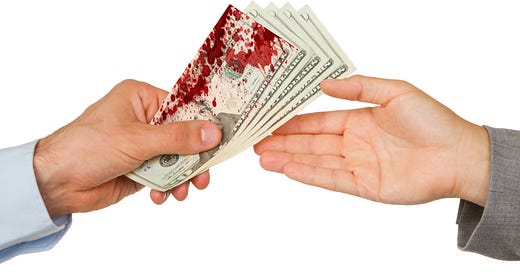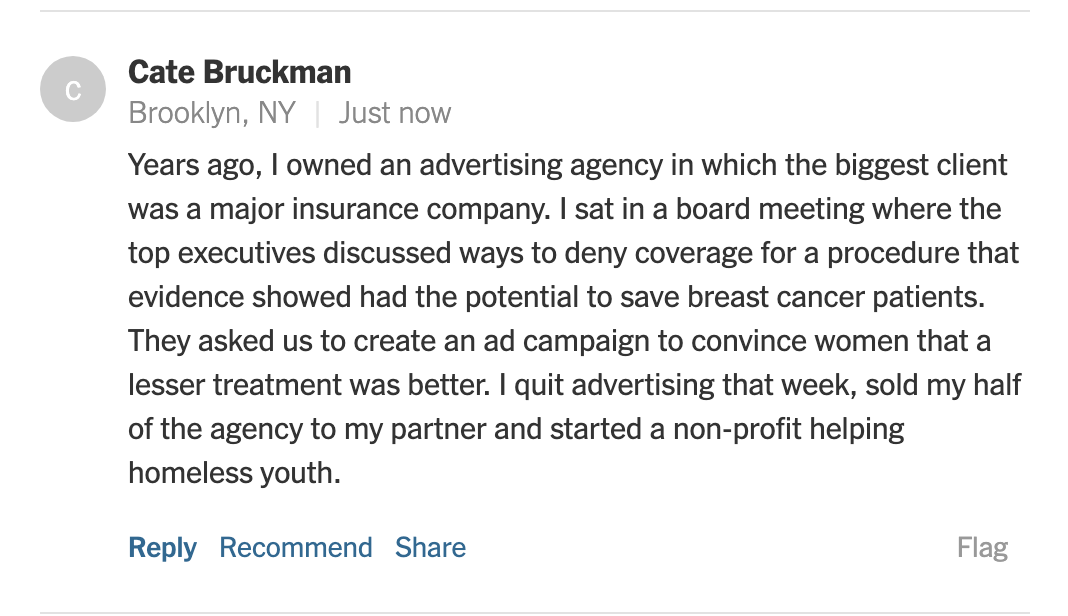How do you earn your living?
Do your earnings depend on the death or suffering of others; destruction of the planet; or duping consumers into buying harmful products? Maybe reassess your mandate instead of hiring more security.
“The visceral response from people across the country who feel cheated, ripped off, and threatened by the vile practices of their insurance companies should be a warning to everyone in the healthcare system. Violence is never the answer, but people can be pushed only so far.”
-Sen. Elizabeth Warren, in an interview with the Huffington Post
Before I begin throwing stones, let me state up front that I have lived in several glass houses, even if it took me awhile to see through them. So I am just as culpable as the next person of having profited off of the suffering of others. Let’s just list those jobs quickly and get this (and my shame) over with:
From 1988-92, I worked as a photojournalist. I went into it thinking it was important to bear witness to history, social ills, the horrors of war, etc. And that part of my job, indeed, felt good and noble. The less noble part, because most of us were freelance, felt like waiting around for someone to get shot or killed, so we could shoot photos of this and pay our rent.
Between late 2013 and early 2014, I worked at what I thought was an online health magazine. Again, I went into it with good intentions. Turns out, it was an online pharmaceutical ad machine wherein the “journalism”—I use that term loosely—was in service of the ads rather than vice versa.
From late 2015 to early 2017, I worked as a VP at a PR/marketing agency in their health department. I took that job out of desperation, to put two kids through college while raising a third on my own and getting divorced. I ended up working on marketing campaigns for an Alzheimer’s drug whose approval one FDA advisor called, “the worst approval decision that the F.D.A. has made that I can remember.” I worked on another equally controversial campaign for a drug to help opioid addicts poop.
Today I earn my living writing this publication and books, editing others, writing stories for other publications, selling the occasional photograph, and shooting headshots. In other words, yes, I might be eating cat food in my dotage, but I made a conscious decision that my career and my morals could not reside in separate buckets. Now, every night when I go to sleep, I do so knowing my work does not harm others. Sometimes, I think, it even helps them. (I think this because some of you actually pay for this work and/or have written me personal notes telling me how it has helped you. Thank you. Each one of those missives is, to me, greater than any gold.)
Then last week happened. The shooting of one human being by another. Which instead of eliciting only horror also became an immediate lightening rod, triggering a massive and ongoing backlash against the American health insurance industry.
Other CEOs took note and rushed to beef up security. My first thought, upon reading that, was: Sure, that makes sense, but also…no one would have ever tried to kill Ben & Jerry1.
I tried to imagine which other CEOs were making those calls to security firms. Were they the heads of soft drink companies, whose revenues depend on selling health-shattering, diabetes-inducing high fructose corn syrup to the masses? Were their companies making jewelry out of blood diamonds which, according to Amnesty International, still exist and are “responsible for funding recent conflicts in Africa which resulted in the death and displacement of millions of people”? Were they billionaires2 like Elon Musk, our future shadow president, whose hoarding of wealth, without paying their fare share of taxes, has led to the kind of income disparity in this country that turns poverty into a form of daily, ongoing violence? Were they pharmaceutical CEOs, who run companies that have done much good in the world, from cancer medications to vaccines, but who also continue to charge exorbitant fees for life-saving treatments, funded with U.S. government assistance and tax breaks allowing them to pay essentially zero taxes while reaping massive profits? Were they oil company executives, who are fighting the end of gas-powered cars with every lobbying dollar at their disposal while our planet, literally, burns from their greed? (This paragraph could go on and on. You get the picture.)
I want to stress, once again, that I do not and never will condone murder or violence of any kind. But also Arendt’s banality of evil is real. Hitler, as Danny Goldhagen once pointed out, had and endless supply of willing executioners: ordinary Germans willing to do the daily grunt work of genocide because being a Nazi, after all, was a job. Just like being a hitman in the mafia, selling heroin on a street corner, trafficking sex workers, denying health insurance claims, charging a king’s ransom for medication, and creating products that kill people or the environment is a job. And until we face up to not only how blithely we accept this banality of evil in so many of our industries but also to how intricately all of these economic systems are intertwined—until we realize that corporate greed, inflated CEO salaries, favoring the shareholder over the worker, income inequality, environmental destruction, and tying health insurance to employment is literally killing people—all of us, in our silent acceptance of these systems, have blood on our hands.
It’s funny. I’ve spent the past few months watching all five seasons of The Wire. Which I never saw back when it was popular because I was too busy being exhausted and broke while raising children in a country that charged me $9000, out of pocket, to birth each of my three babies; not providing paid maternity leave; not providing affordable childcare; and forcing me to argue with insurance companies for every pregnancy-induced ailment—and there were many, and we don’t talk about this enough—that followed.
For those of you who still haven’t seen it, The Wire is a brilliant show not only about the drug trade in Baltimore, but also about how every system we accept and take for granted as normal here in the U.S.—lack of funding of our public schools; corrupt politicians; the prison industrial complex; bad-faith journalism; lack of a safety net for parents, the poor, and/or the drug-addled; the mindless worship of luxury goods; the emphasis of profits over people; the high cost of housing; etc.—contributes to the coarsening of our society and, yes, to many, many unnecessary deaths.
My favorite characters were those with deeply moral cores despite major character flaws: Bubbles, the affable heroin addict who somehow managed to beat the odds and his own addictions to live an upstanding life; Gus Haynes, the gruff city desk editor who’s the only one questioning a lying reporter; Prez, the incompetent and rash cop who becomes an excellent public school teacher; and yes, even Omar, the Robinhoodesque stick-up man with a strict moral code. What each of these characters did, in their own way, was to take a stand against a system they saw as corrupt and corrupting, even if some of them ended up dead (Omar) or disillusioned (Gus, Prez) in the end.
Last week, while simultaneously watching the news of the United HealthCare CEO murder and The Wire, with fact and fiction speaking to each other and blurring in my head, I also saw some extraordinary things. People taking stands against their own industries, choosing morality over profit. Like this comment in the New York Times.
Or this conversation with Wendell Potter, a former CIGNA communications director who walked away from a large health insurance industry salary, when he saw what that industry was doing to his fellow citizens, to become an advocate for health insurance payment reform.
And I guess, in my own way, this is what I’m asking of all of us, even if societal change can feel impossible. Especially during these next four years, with corruption, misogyny, racism, white supremacy, and bad faith actors already running rampant. Because what each of us does, in our day-to-day lives, matters. Take a stand against the status quo. No, do not murder CEOs. Please! But do take a look at your own role in this complicated social system we’ve created. Think about where your money comes from, where you’re spending it, and what kinds of goods and services you’re willing to spend it on. And then try, every day, to live by a moral code. Whatever that may look like to you.
Blood money will always exist. But we don’t have to take it. And we don’t have to contribute to a system that encourages it. And the more we can each do to elicit change and take a moral stand, the faster change and a more just system will come.
Ben Cohen and Jerry Greenfield, founders and former CEOs of the ice cream company Ben & Jerry’s, who have made it their mission to “be a social justice company that makes ice cream” to work to “strengthen a concept we call ‘linked prosperity.’”
If I were god or congressperson or someone who could make better rules become the norm, I would make a rule that, once you’ve earned $999,999,999, that’s it! You’ve won the game! The rest goes to taxes. (Maybe they could get a special bell or something when that happens, like the one they ring on the stock exchange.)







I have suffered with nearly every type of health insurance available to freelancers in the United States. All are terrible. When I was pregnant, I fought with CIGNA every month to pay for my prenatal appointments. Each month they would reject the claim for a different reason, even though the doctor's office sent in the same form, filled out the same way. What saved me from financial ruin was that I was fired up with mama-to-be hormones and I fought back. It is unfortunately that we cannot count on efforts from our elected officials to improve this wretched system--ironically they all have excellent government-funded health insurance, paid for by taxpayers who cannot afford good insurance for their own families.
The ideas you speak about here are in line with the Buddhist concept of pursuing Right Work—that is, work that does not cause harm to others. Many people are not in a position to make this choice—they have to find income however they can—but I agree that those of us who can make a choice should try our hardest to find work that preserves our integrity.
Bullseye.